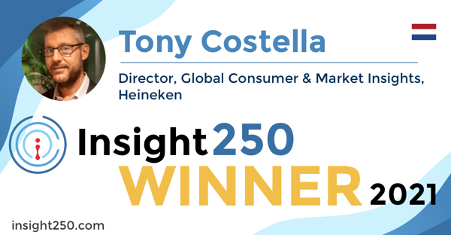


The Insight250 spotlights and celebrates 250 of the world’s premier leaders and innovators in market research, consumer insights and data-driven marketing. The inaugural list was revealed this April and created renewed excitement across the industry whilst strengthening the connectivity of the market research community.
With so many exceptional professionals named in the Insight250 it seems fitting to tap into their expertise and unique perspectives across an array of topics. This weekly series does just that; inquiring about the expert perspectives of many of these individuals in a series of short topical features.
With climate change high on politicians agendas, following unprecedented tornadoes (Ida) in the US last month, flooding in Europe, fires in APAC and with COP26 (the climate change conference) being held in Scotland next month, this edition features two expert leaders who are not only at the forefront of global insight delivery, but also tackling the challenges of achieving sustainability. Tony Costello is the Director of Global Consumer & Market Insights for Heineken and Dr. Nick Baker is the Global Chief Research Officer for Savanta.
As markets evolve and shift the need for sustainability is increasing on a global, regional and local basis. Nick and Tony discuss their perspectives on achieving sustainability as well as the challenges and innovations that are shaping the related initiatives.
Crispin: How are your businesses leading on sustainability and why do you believe it is so important?
Tony: At Heineken, we have set clear objectives and targets towards what we call ‘Brewing a Better World’ – (i) to carbon neutrality across our entire value chain by 2030; maximising circularity and replenishing water we consume (ii) an inclusive and diverse work environment; fair & safe business practices and supporting communities we work in and (iii) support responsible drinking; always offering a 0.0 alternative and promoting moderation.
It is critical to not just talk about these lofty goals, but have a clear plan and measurable targets to hold ourselves accountable to. And while there is still a large gap between the number of consumers claiming interest in sustainable topics, and those truly acting on it – this gap is closing over time, and increasingly having clearly stated values that the company authentically lives by is more important than ever.
Nick: Savanta is a signatory to the MRS Sustainability Pledge, committed to achieving a Net Zero business, hopefully as early as next year. As part of the Next 15 Group plc we have accelerated our commitment to running a more sustainable, equitable and diverse organisation that displays leadership in governance and values. We are using the internationally recognised B Corp framework to focus our strategy on people, planet and profit.
As a founder member of the Insight Climate Collective alongside Jem Fawcus (Firefish), Louise McLaren (Truth), Russ Wilson (Amazon) and Denise Hicks (C-Space), this is an issue central to my view of all our responsibilities, especially in our roles as senior business leaders with the ability to influence more than our own personal behaviours. Sustainability has been core to my personal beliefs for a long time, even before my PhD 20 years ago on Green politics and how to drive positive change on sustainability through the largely resistant social and political institutions.
Crispin: Nick mentioned the MRS Net Zero (Sustainability) pledge – here’s a link for those wanting to learn more https://www.mrs.org.uk/topic/sustainability-in-research). Nick, you are involved with the Insight Climate Collective – what are their objectives and how can people get involved?
Nick: To address the sustainability crisis, we need collaboration and systemic solutions. This will require a fundamental shift in governance and the economy, driven and supported by changes in society and culture, and individuals’ attitudes and behaviours. The ICC believes that business plays an essential role in addressing the sustainability challenges we face. Companies are part of the connective tissue between people and Government.
As per our Manifesto, we want to be part of a sector that takes a lead in:
- Keeping its own house in order with published industry ‘environmental performance index and measures’ (as per D&I measures).
- Achieving net zero targets as businesses and on work for our clients.
- Ensuring that climate considerations are at the heart of how we run our businesses and support our clients.
- Providing resources to business and government to support and drive the emerging changes in new ways of doing business and the attitudes and behaviour that will go with it.
- Providing training and education to people in our industry and beyond.
- Actively lobbying, promoting and supporting the debate, using our expertise in insight and human behaviour as a support and a force for change.
We are currently working with many from across the Insight sector on initiatives building up to the 26th UN Climate Change Conference of the Parties (COP26) in Glasgow on 31 October – 12 November 2021. Please check out our LinkedIn Group https://www.linkedin.com/groups/8984800/
Crispin: Tony, is the drinks category becoming more sustainable and what changes can we expect to see in the future? How can insights accelerate these trends?
Tony: Yes, there have been a number of recent high-profile examples of brewers making bold moves to improve sustainability (e.g. reducing plastic, greater use of recyclable packaging). I truly hope that we can start to see transparent and consistent ways for consumers to understand the full sustainability credentials (across the entire value chain) of products.
Crispin: Nick, as Chairman of the MRS you have been instrumental in the MRS Sustainability Pledge – why should everyone sign-up?
Nick: It’s been a central part of what the MRS has looked to achieve in the last year alongside other important initiatives around diversity, equality and inclusion. Like the work Rebecca Cole is leading on with representative samples and of course lobbying the government to protect our industry and workers across all disciplines, but in particular those in qualitative and face-to-face work who have been so affected by the Covid-19 crisis.
On Sustainability, from where I stand there is no reason businesses shouldn’t commit to being more sustainable, to pushing themselves to operate in a carbon neutral manner and to do so in a way that doesn’t acquiesce to in-action. Ultimately, committing to this is our responsibility and not doing so sends a clear sign.
Crispin: How do researchers ensure they have impact? Do we have a responsibility to highlight sustainability and responsibility within the overall findings and commercial implications on all (relevant) projects?
Tony: Absolutely! As Insights professionals, our role is to ensure the right (sometimes difficult) questions are being asked, not just simply providing simple answers. We sometimes need to provoke – challenging the business to ‘deliver the and’ – those products/ solutions that can meet short-term growth objectives and move us closer to our long-term vision.
Nick: We have a responsibility to our clients, to produce commercially – in whatever form that be public sector or private – impactful work. In today’s world, I can’t see how understanding things from a sustainability perspective as part of that is not relevant. We need to be careful to ensure we keep to our brief, but even where sustainability might not be front and centre it is clearly a significant issue that all organisations need to be conscious of as we work collectively towards the Paris Climate agreement 2050 Net Zero requirement. Whatever we can do to drive successful outcomes for clients with a core focus on sustainability as part of it, we should definitely be doing so. Put simply, if we don’t, time is running out.
Crispin: Single use plastics, species loss, climate change, habitat destruction, sustainability, responsible business practices it’s all a bit overwhelming, where should we start – what are Heineken and Savanta doing to innovate and lead?
Tony: The start, as in many situations, is setting targets, committing (internally and externally) and consistently measuring & reporting. We’ve done that now, setting clear and aspirational goals with the start of a road-map that can make a meaningful difference. While there is so much we could do in our efforts to ‘Brew a better world’, we’ve made some clear choices on the topics where we as a company have the biggest impact. This has been very motivating across the organisation – and been very well received externally.
Nick: Well, I have always believed something is better than nothing and there’s no reason why anyone or any business can’t do something that progresses us towards a more sustainable future. Net Zero or B Corp status might seem daunting but that doesn’t mean they aren’t realistic. The first requirement is awareness and knowledge of what improves things, then doing it. The Insight Climate Collective are looking to enable tools and guidance alongside the MRS (such as Green Element’s Carbon Calculator for the research industry) and these will hopefully help enable more of us to take concrete steps on the path to a sustainable future.
Crispin: How do your businesses ensure they continue to innovate – how can insight professionals contribute?
Nick: Innovation takes many forms and for Savanta it’s about ‘new, new’ and about the reapplication of ideas in a new context. This can be methods, technologies or approaches like the use of behavioural theory to guide genuinely impactful segmentation or advertising effectiveness work. Key to this though is culture, and rather than recite Peter Drucker’s well known quote on strategies and breakfast, I think at the core of that culture is something else he pointed out – ‘“The most serious mistakes are not being made as a result of wrong answers. The truly dangerous thing is asking the wrong question”. Learning to identify those dogs that don’t bark’ and to ask good questions are crucial in driving innovation and if we can’t do that, then we really have a big problem as an industry.
Tony: Ensure we continue to understand the evolving needs of consumers, and thinking how we can improve people’s lives is the only way to sustainably grow through innovation. This means constantly staying close to consumers and understanding their explicit needs – and increasingly anticipating the needs people can’t articulate yet. This is where a strong, embedded insights team, with great partners and tools can really make a difference.
Crispin: What are the biggest innovations you feel we will see in the drinks category?
Tony: The drinks category has seen some significant change over recent years, with category boundaries blurring, new innovations emerging, and premium niches appearing in what were thought of as commodity spaces. It’s an exciting time with multiple mega-trends coming together, and many established and emerging unmet needs to deliver against. I’m not going to be foolish enough to predict what will be the biggest innovations, but confidently forecast a significant shake-up in the beverages industry as consumer focus will become as/more important than distribution networks for the first time.
Nick: Savanta’s Colin Moyer recently wrote, ‘the new generation of food and drink products is being driven by heightened attention to health and the link between what we consume and our physical and mental wellbeing.’ Our work in this area tells us that we’re collectively leaning towards healthier food products, vegan options, low-sugar and low-fat. In the drinks sector we have plant based, alternative milks, low sugar and alcohol free. Street food is changing the way we eat out while Deliveroo, Just Eat and others have made staying in easier than ever. So I suspect Guinness Clear will be the top drink of 2022 (https://www.youtube.com/watch?v=907B0pAed_k)
HOT TOPIC: Artificial Intelligence:
Crispin: How is AI changing the way your business works and will it replace the need for researchers?
Tony: Artificial intelligence, machine learning and other advanced analytic approaches are all having a tremendous impact on the insights function and the industry at large. The toolkit available to us is increasing exponentially, and it is unquestionable that we are able to surface patterns and insights in data that we never would have been able to see before. However, typically these analyses are great at explaining (and even predicting) what is happening or going to happen – but real insight lies in explaining why. Truly understanding causation not just correlation.
For now, and for the foreseeable future this is best done with a combination of mind and machine, and those that are able to get the right balance of leveraging advanced analytics and blending it with true deep consumer insight will have the edge. We are fully embracing this at Heineken and have an Analytics group working arm in arm with ‘traditional’ insights teams.
Nick: At Savanta we have our own in-house technologies, development team and have tech as a core pillar of our business. AI has already got more of a role than most are often aware of, it’s one of the things eating the core traditional ‘question and answer’ research business of old. That’s not a problem, it’s a challenge to us, to understand and deploy our skills in tandem – it’s the ‘holy grail’ of the what and the why which definitely is still enabled by researchers, researchers guiding and enabling the possibilities of AI not fighting them.
TOP TIPS
Tony: ABC – Always be Curious. Always be the person asking questions, re-framing the problem and challenging assumptions. “Computers are useless. They can only give you answers.” This is one of my favourite (I believe is from Pablo Picasso) – but ever more relevant today!
Nick: ‘Research has no value until it’s used’ (J Gambles). Make it impactful, drive decision-making through ensuring activation not in-action. Our roles are to enable others, this doesn’t mean data, it means applied data, direction, and commercially viable solutions not bland ‘recommendations’. That final ‘recommendations’ slide in so many presentations should be banned, what it means and what to do should permeate all we do.
Crispin: Thanks Nick and Tony, some fascinating insights on the drinks industry, artificial intelligence and something close to my heart, sustainability. On that subject there are two important online conferences on sustainability this Autumn that I encourage everyone to sign-up for – Insight250 Winners Alex Hunt of Behaviorally and James Endersby of Opinium, alongside Maru and Protobrand have teamed up to run a free client led event on sustainability “We Better Behave” (https://webetterbehave.live/) and the MRS are also running a Sustainability Summit 2021 on 11th Novemebr 2021. For more information contact conference@mrs.org.uk. There is so much to do but every journey starts with one step and I encourage everyone to take a first step, for example, champion banning single use plastics in your workplace and definitely sign up to these two events.


